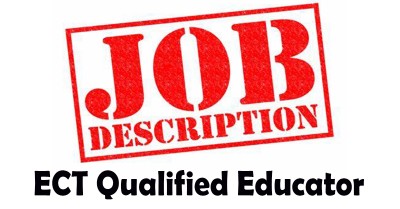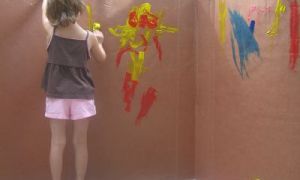The role of early childhood teacher is to support the implementation of an approved learning framework, to support children’s wellbeing, learning and development and to provide support in the development and implementation of services for children aged birth to school age
KEY RESPONSIBILITIES AND DUTIES:
1. PLAN AND IMPLEMENT A QUALITY EDUCATIONAL PROGRAM
- Develop, weekly plans, and implement age-appropriate programs for children in care.
- Provide programs and activities that reflect the children’s learning and growth.
- Provide developmental progress reports as required
- Plan, implement and evaluate programs which reflect the emerging skills, interests and developmental requirements of children
- Prepare, implement and evaluate a play-based developmentally appropriate program for individual children and groups which recognises social and cultural diversity
- Foster children’s learning through modelling and the implementation of a play-based learning environment responsive to children’s interests, strengths and abilities.
- Implement the services statement of philosophy and ensure that it guides pedagogy and teaching decisions.
- Mentor and teach educators along with the educational leader through observations, guided discussions and recommendations for professional development on curriculum practices
- Seek and share best practice examples to improve the educational program.
- Model effective application of pedagogy in teaching practice.
- Assess children’s learning and development and apply pedagogical expertise to inform curriculum decisions.
- Maintain expert knowledge of the National Quality Framework (NQF) and support the Centre performance to meet and/or exceed all National Quality Standards (NQS)..
- Actively contribute and support the Centre’s continuous improvement through the Quality Improvement Plan (QIP).
- Deliver specific learning program and practice within long daycare and/or kindergarten services to prepare children for their first year of formal schooling.
- Develop meaningful pedagogical documentation and reflective practice.
2. PROMOTE THE HEALTH AND SAFETY OF ALL STAFF AND CHILDREN
- Maintaining a working knowledge of and adhering to legislation guidelines, policies and procedures pertaining to child protection
- Identify any risk of harm to child protection and young people and in conjunction with the service team leader and parents/carer’s where possible reporting concerns to re relevant statutory body
- Ensure that child protection policy are adheres to by all team members
- Adhere to own professional standards and codes of ethics and maintain professional development, including keeping up to date with current practices, resources and frameworks appropriate.
- Ensure the quality of direct service provisions is of a consistently high standard
- Ensure the implementation of access and equality principals for families and children in care are maintained
- Ensure a potential supervision risk is reported to other educators or Director
- Ensure a high standard of hygiene is maintained in compliance with policies and procedures
- Ensure that accurate and detailed records of injury/accident/trauma and medication forms are kept..
3. BUILD POSITIVE RELATIONSHIPS WITH ALL STAKEHOLDERS
- Maintain ongoing communication with educators’ parents and caregivers including other services when required.
- Assist families with the children’s transitions, also ensure that families are provided with guidance and support when required.
- Develop positive channels of communication to ensure the smooth running of the service amongst all educators.
- Lead and model the effective application of pedagogy in teaching practice.
- Contribute to a professional learning community in the Centre and the wider Goodstart network.
- Lead and mentor Educator/s and the Centre team to build and sustain a constructive teaching environment and identify professional development opportunities and manage performance (where relevant).
- Seek examples of best practice to build capability and contribute to the Centre’s performance.
- Lead, role model and communicate best practice to Educator/s and the Centre team to encourage high performance and maintain a positive team environment.
- Support the Centre’s commitment to Goodstart’s inclusion goal to ensure access for all children and families.
- Support the Centre Director to ensure families and children especially those experiencing vulnerability can meaningfully participate within the program.
- Ensure timely support and follow up is provided in collaboration with families
- Liaise with and support families; respecting child-rearing practices and beliefs.
- Along with the Director, engage positively in the orientation, enrolment and transition processes for families and children.
- In the event of concerns with children consult with Director to organise and participate in meetings with relevant support agencies and parents.
4. CONTRIBUTE TO THE EFFECTIVE MANAGEMENT OF THE SERVICE
- Support a culture of reflective practice and continuous improvement.
- Contribute to a professional and positive work culture
- Assist with administrative duties as requested.
- Take on the role of director in their absence
- Advocate for children and their families
- Contribute to the Centre targets through effective room management.
- Maintain a sound understanding of requirements for universal access to every child’s education, particularly as it applies to the group of children in the final year before formal schooling (if relevant to your state).
- Effectively lead and manage the room and resources and prioritise and direct activities to maximise an effective learning environment.
- Maintain strong organisational knowledge of Goodstart and the Centre to deliver a high-quality education program and practice in the room (where relevant).
- Contribute to the development, implementation and review of the Centre plans.
References:
- ECT Trainer, Sutherland Shire Council
- ECT Position, GoodStart Early Learning



 As an Educator in Australia, your pay rate falls under the Children’s Services Award 2010. This award states the minimum amount that an employer can
As an Educator in Australia, your pay rate falls under the Children’s Services Award 2010. This award states the minimum amount that an employer can When working as a qualified Early Childhood Teacher (with a university degree) within a service, your rate of pay will come from the Educational Services
When working as a qualified Early Childhood Teacher (with a university degree) within a service, your rate of pay will come from the Educational Services When working as a Diploma Qualified Educator your pay rate is from the Children's Services Award 2010. This Award states your minimum rate of pay
When working as a Diploma Qualified Educator your pay rate is from the Children's Services Award 2010. This Award states your minimum rate of pay When working as a Cert 3 Qualified Educator, your pay rate is from the Children's Services Award 2010. This Award states your minimum rate of
When working as a Cert 3 Qualified Educator, your pay rate is from the Children's Services Award 2010. This Award states your minimum rate of Educational Leaders play a crucial role in their early childhood service by ensuring that the educational program aligns with best practices and supports the holistic
Educational Leaders play a crucial role in their early childhood service by ensuring that the educational program aligns with best practices and supports the holistic In early childhood education and care, ratios are more than a technicality—they are a frontline safeguard. Every child deserves responsive supervision, emotional connection, and developmental
In early childhood education and care, ratios are more than a technicality—they are a frontline safeguard. Every child deserves responsive supervision, emotional connection, and developmental Here’s a comprehensive Mobile Phone and Smart Watch Policy tailored for early childhood education and care (ECEC) services in Australia, aligned with the latest 2025
Here’s a comprehensive Mobile Phone and Smart Watch Policy tailored for early childhood education and care (ECEC) services in Australia, aligned with the latest 2025 With the new national child safety reforms kicking in on 1 September 2025, early childhood services like yours have a real opportunity to lead the
With the new national child safety reforms kicking in on 1 September 2025, early childhood services like yours have a real opportunity to lead the The Sea of Fish Challenge is a national initiative that invites children, educators, families, and communities to create and display fish artworks as a symbol
The Sea of Fish Challenge is a national initiative that invites children, educators, families, and communities to create and display fish artworks as a symbol Across the early childhood education and care sector, educators are sounding the alarm: current staffing ratios are insufficient to deliver safe, meaningful, and developmentally appropriate
Across the early childhood education and care sector, educators are sounding the alarm: current staffing ratios are insufficient to deliver safe, meaningful, and developmentally appropriate


